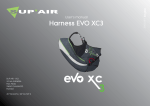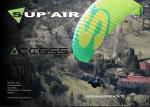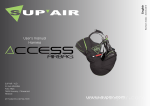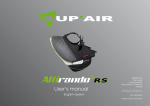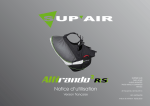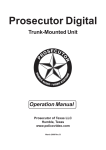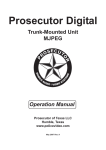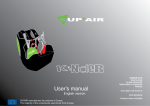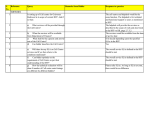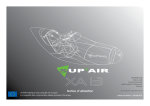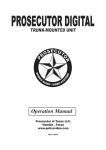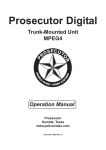Download Harness EVO XC3
Transcript
Harness EVO XC3 SUP’AIR - VLD 34 rue Adrastée Parc Altaïs 74650 CHAVANOD FRANCE 45°54.024’N / 06°04.725’E English 25/03/2013 User’s manual User’s manual EVO XC3 Thank you for choosing an EVO XC3 ! We are proud to join you on your journey in our common passion: paragliding. SUP’AIR has been designing producing and selling accessories for free flying activities since 1984. By choosing a SUP’AIR product you benefit from almost thirty years of expertise innovation and listening to customer feedback. This is also our philosophy: working endlessly to develop better products and to maintain a high quality production in Europe. We trust that you will find this manual comprehensive, explicit and hopefully pleasant to read. We advise you to read it carefully ! On our website www.supair.com, you will find the lastest updated information about this product. If you have any further questions, feel free to ask one of our retailers. And of course, the entire SUP’AIR team is at your disposal through [email protected] We wish you many safe flights, enjoyable hours and happy landings. The SUP’AIR team Pilote : Jérome Maupoint, SUP’AIR SUP’AIR manufactures its products in Europe. Most of the components used are Made in Europe. SUP’AIR_EVO XC3 Page2 User’s manual EVO XC3 Introduction Technical specifications Size choice Nomenclature Harness overview Seat plate assembly BUMPAIR assembly Speed-bar system Foot-rest (Option) Reserve parachute installation Speedbag + optional cockpit assembly Shoulder straps adjustments Behavior in flight Pre-Flight check Contents 4 5 6 7 8 9 10 11 12 13 18 22 25 26 In flight Complements/Accessories Maintenance Cleaning and harness maintenance Storage and transport Product lifespan Repairs Materials Recycling Respecting the environment Disclaimer Pilot’s gear Service Book 27 26 31 31 31 31 32 32 32 33 33 33 34 Pilot : Jérome Maupoint, SUP’AIR. SUP’AIR manufactures its products in Europe. Most of the components used are Made in Europe. SUP’AIR_EVO XC3 Page3 User’s manual EVO XC3 Introduction Welcome to the world of paragliding ! With the EVO XC3 you are equipped with a complete product to help you broaden your horizons and let you discover new Cross Country thermal flights. With its great comfort level, a BUMPAIR 17 cm, and a reserve parachute pocket under the seat, you will be able to handle any kind of soaring condition anywhere. After reading this manual, we suggest you check your harness by conducting a hang-test prior to your intitial flight with it. N.B : Three important icons will help you understand this manual : Advice. Caution ! Danger !! SUP’AIR manufactures its products in Europe. Most of the components used are Made in Europe. SUP’AIR_EVO XC3 Page4 User’s manual EVO XC3 Technical specifications Pilot size Pilot weight (cm) Harness weight in standard version ( Bumpair 17cm, wooden seat plate, two self-locking carabiners ) Harness weight in « + » version ( Bumpair 17cm, carbon fiber seat plate, foot-rest, risers, two A B C D E F self-locking carabiners ) Backrest height (cm) Reclined seating height (cm) Seat length (cm) Seat width (cm) Carabiners height (cm). Carabiners distance between the two (cm) Impact damping system : Airbag (Volume) S M L XL 160-175 cm 165-185 cm 175-195 cm 195-205 cm 50-75 kg 60-90 kg 70-100 kg 80-110 kg 4558 g 4638 g 4938 g 4315 g 4395 g 4695 g 65 37 44 33 44 39-50 67 38 48 35 44 39-50 70 39 49 37 44 39-50 75 40 51 39 44 39-50 No Yes EN 1651 - LTF Possible No Yes No Impact damping system : Bumpair (Thickness) Certification A Hauteur du dos E Hauteur des points Flight : tandem (Pilot- Passenger) Hauteur réglage de Distance entre les F points du Flight : acrobatic flying B l'inclinaison dossier Take-off : Winching - towing C Longueur d'assise Jettisoning carabiners compatibility D Largeur d'assise F E A B D C SUP’AIR manufactures its products in Europe. Most of the components used are Made in Europe. SUP’AIR_EVO XC3 Page5 User’s manual EVO XC3 Size choice Choosing your harness size is important. You will find below a measurement chart to help with your selection. We recommend you to try out the harness in different sizes during a hang test at the nearest SUP’AIR dealers location for proper fitting. For a complete list of our retailers please click here : www.supair.com Preliminary test under hanging device. Size Weight 50 55 60 65 70 1m45 1m50 1m55 1m60 1m65 1m70 S S S S S S S S S 1m75 1m80 1m85 1m90 1m95 2m 2m05 XS M M M M 75 M M M 80 85 90 95 100 105 110 M M M M L M M M L M L L L L L L L L L L XS/S S XL XL XL XL SUP’AIR manufactures its products in Europe. Most of the components used are Made in Europe. S/M M L XL XL XL XL XL XL XL XL XL XL XL XL XL XL XL M/L L L/ XL XL SUP’AIR_EVO XC3 Page6 User’s manual EVO XC3 Nomenclature EVO XC3 harness 1 2 3 1 4 Standard version. 2 4 BUMPAIR 17 XC Wooden seat plate ( see corresponding size on page 9 ) 30 mm Self-locking Zicral 5 Reserve parachute handle ( ref : E2 ) 3 5 6 Version + 2 4 BUMPAIR 17 XC Carbon fiber seat plate, see corresponding size on page 9 30mm Zicral Self-locking carabiners 5 Reserve parachute handle ( ref : E2 ) 6 7 Solo Dyneema individual risers 8 7mm Maillon Rapide® 9 Toric ring ( x2 ) 10 Self-retractable foot-rest 20mm 9 7 10 8 11 Options 11 Standard double stage speedbar 12 EVO CX3 Speedbag SUP’AIR manufactures its products in Europe. Most of the components used are Made in Europe. SUP’AIR_EVO XC3 Page7 User’s manual EVO XC3 Harness overview This illustration will help you understand the manual content. 6 12 1 2 3 11 4 13 5 7 8 5 9 10 7 1 Attachment points. 2 Main buckles. 3 Chest strap adjustment. 4 Leg straps. 5 Backrest tilt adjustment. 6 Shoulder straps adjustments. 7 Seat plate angle adjustment. 8 Seat depth adjustment. 9 Foot-rest buckle. 10 Speed-bar guide. 11 Reserve parachute handle. 12 Dorsal pocket. 13 BUMPAIR placement. 9 SUP’AIR manufactures its products in Europe. Most of the components used are Made in Europe. SUP’AIR_EVO XC3 Page8 User’s manual EVO XC3 Installing the seat-plate. The EVO XC3 can be equipped with a wooden or a carbon fiber seat plate to loose overall harness weight. Once the seat plate is fully inserted in its housing, fold the hood over it. Lift the rear end of the seat fabric, and insert the seat plate leading edge first. Push the seat plate all the way to the end of the housing. Corresponding seat plates for the various harness sizes. Size S Wooden seat plate. Carbon fiber seat plate. Size M Size L Size XL Wooden seat plate. S 33x34 Ref. ( Reference ). : MPPL017 Wooden seat plate. M 35x37 Ref. ( Reference ). : MPPL018 Wooden seat plate. L 37x37 Ref. ( Reference ). : MPPL019 Wooden seat plate. XL 39x37 Ref. ( Reference ). : MPPL020 Carbon fiber seat plate. S 33x34 Ref. ( Reference ). : MPPL005 Carbon fiber seat plate. M 35x37 Ref. ( Reference ). : MPPL006 Carbon fiber seat plate. L 37x37 Ref. ( Reference ). : MPPL007 Carbon fiber seat plate. XL 97x37 Ref. ( Reference ). : MPPL008 SUP’AIR manufactures its products in Europe. Most of the components used are Made in Europe. SUP’AIR_EVO XC3 Page9 User’s manual EVO XC3 BUMPAIR assembly. BUMPAIR housing. Dorsal pocket. Inside the dorsal pocket : open the vertical zip. Insert the BUMPAIR 17XC inside the slot. BUMPAIR 17 XC. Push the BUMPAIR between the exterior of the container and the BUMPAIR housing. Once the BUMPAIR is fully inserted inside its housing, push behind the dorsal pocket. Once the BUMPAIR is fully inserted inside its housing, close the vertical zipper. SUP’AIR manufactures its products in Europe. Most of the components used are Made in Europe. SUP’AIR_EVO XC3 Page10 User’s manual EVO XC3 Installing the speed-bar system. The EVO XC3 is pre-equipped to use a speed-bar as most of our harness models are. Within the SUP’AIR gear lineup, the standard speed-bar is the most adaptable for being the lightest and self-retractable. C A A Lines B Crimped hooks C Elasticated self-retractable speed-system 1 Push the accelerator cord through the D guiding tube. 2 Push the speed-bar line through the pulley. 3 Push the accelerator cord through the lateral skirt slot. E 4 4 5 D E Attach the end of the speed-bar lines to the crimped hooks which is to be connected to the riser’s crimped hooks. Adjust the lines length and securely knot it. Self-retracting speed-system: push the elastic cords through the ( D ) ring to connect them to the white loop stitched on the inner sides of the harness. F Speed-bar cord. 1 6 2 If the accelerator is not used, the lateral skirt can be folded over and around the guiding tube and close by pressing the button. F 5 Elasticated recoil cord. Elasticated recoil cord. (D) shaped buckle. 3 5 SUP’AIR manufactures its products in Europe. Most of the components used are Made in Europe. SUP’AIR_EVO XC3 Page11 User’s manual EVO XC3 Foot-rest installation (Option). C The EVO XC3 is pre-equipped to accept a retractable footrest 20mm (A). A Push the elastic under the guide (C). 2 B Push the foot-rest strap through buckle (B) located at the front of the harness side skirt. D Wrap and connect the elastic around the main strap while pushing it through buckle (D). D 1 3 Inner view. Outer view. B SUP’AIR manufactures its products in Europe. Most of the components used are Made in Europe. Adjust the foot-rest length during a hang-test, and stow away the straps excess in the elasticated holder. 4 SUP’AIR_EVO XC3 Page12 User’s manual EVO XC3 Rescue parachute setup assembly. Thank you for carefully reading the following! We advise you to have the initial rescue parachute installation done by someone knowledgeable with the process. Connecting the handle to the rescue parachute’s deployment bag. 1. Place the handle inside the middle webbing loop and make a lark’s head knot with the handle. 2. Fasten tightly the lark’s head knot, and verify the solidity of the link. The handle must be connected to the central loop, except for large reserve parachutes ( use side loop ). Must be checked at the end of the installation procedure by gently pulling on the handle, and make certain to disengage both safety pins held in place Setting up the reserve parachute risers guiding sleeves. Completely open the reserve parachute risers guiding sleeve zipper. Connecting the risers to the harness. Make a lark’s head knot configuration with each Dyneema riser on the harness parachute connections. SUP’AIR manufactures its products in Europe. Most of the components used are Made in Europe. SUP’AIR_EVO XC3 Page13 User’s manual EVO XC3 Connecting the reserve parachute to the Dyneema risers Connecting the reserve parachute with the parachute risers using the 7mm carabiners ( Maillon Rapide® ). Secure the bridles in place, using the toric elasticated rings. Connected risers to the harness ( lark’s head knot connection ). Tuck the risers away in the riser sleeve. SUP’AIR manufactures its products in Europe. Most of the components used are Made in Europe. SUP’AIR_EVO XC3 Page14 User’s manual EVO XC3 To close the protective riser sleeve... … lower the zipper tab down to the reserve parachute pocket level... Once the tab can not move further and aligned with the reserve parachute pocket ; bring it up to close the zipper. Place the POD in the pocket. Reserve handle on the seat plate side, lines and handle facing outward. With a small cord : hook the loop - #1 marker. SUP’AIR manufactures its products in Europe. Most of the components used are Made in Europe. Push the cord and the loop through grommet #2. SUP’AIR_EVO XC3 Page15 User’s manual EVO XC3 Push the cord with the loop through grommet #3, and push the handle’s pin through the loop. Then tuck away the pin with the handle’s end behind the neoprene flap #3. With a small cord : hook the loop #4 marker. Push the cord and the loop through grommet #5. Push the cord and the loop through grommet #6. Push the cord with the loop through grommet #7, and push the handle’s pin through the loop. Then tuck away the pin with the handle’s end behind the neoprene flap #7. SUP’AIR manufactures its products in Europe. Most of the components used are Made in Europe. SUP’AIR_EVO XC3 Page16 User’s manual EVO XC3 The tab is located at the end of the zipper on the bridle side ( inside the fabric sleeve ). Top view Upon setup completion, conduct an extraction sequence during a hang-test to verify that all works properly before repeating the installation procedure. Zip up the reserve parachute riser sleeve. Reserve parachute riser protective sleeves. Harness with reserve parachute overview. SUP’AIR manufactures its products in Europe. Most of the components used are Made in Europe. SUP’AIR_EVO XC3 Page17 User’s manual EVO XC3 Speed-Bag + optional cockpit installation C A Sliding system setup B Sliding system connection layout C Speed-bag Bseat-pleat setup D Lateral low bridles E A E D D H E Speed-bag bridle tension adjustment B B Speed-bag foot plate Cockpit SUP’AIR manufactures its products in Europe. Most of the components used are Made in Europe. SUP’AIR_EVO XC3 Page18 User’s manual EVO XC3 1 : Fasten the sliding system straps ( B ) to the buckles beneath the seat. 3: Fasten the Velcro central Speedbag section (E) to the Velcro found at the end inside the harness (F). 2 : Fasten the Velcro connections beneath the Speed-Bag ( D ) in the receiving ends below the Air-Bag. D D C A A A E A B 4: Fasten the Speedbag’s right sided handle with the harness’s Velcro. F C B 5: Fasten the Speedbag’s left side with the harness’s left side snap. SUP’AIR manufactures its products in Europe. Most of the components used are Made in Europe. 6: push the fastening straps through the Speedbag openings, and attach the selflocking carabiners. SUP’AIR_EVO XC3 Page19 User’s manual EVO XC3 7: Remove the split hook from the bridle located on the top right side of the Speedbag. Push the cord through the bridle’s grommet and once more, fasten the split hook with a lark’s head knot configuration. 9 : Left side, push the Speedbag’s lateral high left strap cord, and bring the quick release plastic buckle with the lark’s head knot configuration up. 8: Connect the split hook previously installed, to the other one attached with and elasticated cord to the Speedbag closing buckle on the right side. 10 : A plastic quick-release buckle is found on the right side of the harness. Fasten the buckle to the right side of the cockpit. SUP’AIR manufactures its products in Europe. Most of the components used are Made in Europe. SUP’AIR_EVO XC3 Page20 User’s manual EVO XC3 To enter a harness equipped with a Speedbag once both main buckles of the harness are connected and locked : Close the left side of the Speedbag. Close right side of the Speedbag. SUP’AIR manufactures its products in Europe. Most of the components used are Made in Europe. SUP’AIR_EVO XC3 Page21 User’s manual EVO XC3 Harness adjustments. All those adjustments must be conducted while seating in a hang-test device, and before the initial flight. Shoulder straps adjustments. Loosen Tighten the shoulder straps using the small looped cord by pulling forward (or downward). 1 Loosen by pulling the checkered strap reward. 2 2 Resting precisely on the shoulder straps improves comfort. You must find the perfect equilibrium between the side/lateral trim straps adjustments and the shoulder straps. In a reclined seating position, the shoulder straps also participate to the overall comfort by supporting the upper torso/shoulder area. 1 Tighten Tighten Backrest angle adjustment. Change the backrest angle by pullling the loop. 3 4 Loosen SUP’AIR manufactures its products in Europe. Most of the components used are Made in Europe. SUP’AIR_EVO XC3 Page22 User’s manual EVO XC3 Chest strap adjustment. This adjustment is important for acting on the ABS and the harness overall stability. The tighter the more stable. The opposite is true while still enabling weight-shift steering. To tighten the chest strap: Place your left hand in front of the risers, and grab the right carabiner. With the right hand shorten the distance by, grabing the chest strap finger-loop and pull it to tighten the chest strap. 1 To loosen the chest strap: loosen Place your left hand in front of and pass the risers to grab the right carabiner. Using the left hand, shorten the distance between the risers and pull the finger-loop in the opposite direction to loosen the chest strap. 2 2 tighten 2 1 Seat plate adjustment. This adjustment enables leg support variations toward to front of the seating area. Comfort and seating posture can be improved for pilots with long legs. To tighten and increase leg support to the front of the seat plate : bringing the legs upward will reduce tension on the adjustment buckles, and decrease the effort required to pull the end straps upward. To loosen the tension : raising the legs upward will reduce tension on the adjustment buckles, and decrease the effort required to unlock them with an upward tilt. Tightening Tightening SUP’AIR manufactures its products in Europe. Most of the components used are Made in Europe. SUP’AIR_EVO XC3 Page23 User’s manual EVO XC3 Seat depth adjustment. This adjustment enables the seat depth to be adjusted. It can be an asset when flying with feet on the foot-rest in a more reclined posture. On the other hand, it is not necessary to reduce the seat depth for an adopted upright seating flying posture. tighten To reduce the seat depth : raise your hips while pressing on the foot-rest ( this action reduces the tension on the buckles), and the pull exerted on the adjustment straps ends. To loosen the support : tilt the adjustment buckles and relax the adjustment straps. SUP’AIR manufactures its products in Europe. Most of the components used are Made in Europe. SUP’AIR_EVO XC3 Page24 User’s manual EVO XC3 Inflight behavior. The harness geometry creates a very good symbiosis ou correlation between the wing and seat stability (especially when tightening the chest strap). The EVO XC3 is a stable and dampened harness. The backrest is stiffened thus enabling a better pressure distribution on the entire dorsal area during for long comfortable flights. The EVO XC3 structural design brings an excellent correlation between the wing and the harness (noticeably when tightening the chest strap). SUP’AIR manufactures its products in Europe. Most of the components used are Made in Europe. SUP’AIR_EVO XC3 Page25 User’s manual EVO XC3 Pre-Flight check. Prior each takeoff, conduct a pre-flight verification by running through the following list : • • • • • Check that the harness and the carabiners are not damaged. Be certain for the reserve parachute pocket to be properly closed with its handle securely in place. Check that your personal settings have not been modified. Check the connexion risers / harness as well as the self-locking carabiners ( locked and secured ). Check your speed-bar system if your harness is equipped with one. Only after a thorough weather conditions analysis, can the decision to wether fly or not be made and to outfit yourself with the harness. • Properly and securely fasten the leg / chest strap buckles. • Double check that all buckles are fully locked and secured by pulling firmly on them. Check that no line, tab or cloth is stuck / jammed in the buckles. • Be absolutely certain for the reserve parachute handle to work freely without anything impeding its proper functioning. Main buckles. SUP’AIR manufactures its products in Europe. Most of the components used are Made in Europe. SUP’AIR_EVO XC3 Page26 User’s manual EVO XC3 Flight phases Flight phases The takeoff phase is easily conducted. Once air borne, the transition from running to seating is smooth and effortless. Never keep your steering toggles in hands to push yourself inside the harness, and risk stalling the glider for flying too slow. Never let go the steering toggles when flying close to obstacles. In flight : Once in flight, the harness is very instinctive and precis to handle. Please set the distance between the two carabiners according to aerology conditions, and to the wing manufacturer’s guide lines. Tightening the chest strap provides more stability but less harness piloting efficiency. Beware of the increased risk of riser twisting. The reverse is true, and enables more piloting control, but could become dangerous in turbulent air, with the risk of falling toward the collapsed side of the wing without being able to actively counteract. SUP’AIR manufactures its products in Europe. Most of the components used are Made in Europe. SUP’AIR_EVO XC3 Page27 User’s manual EVO XC3 Speedbar use. We recommend a careful use of the speed-bar due of an increased risk of a potential frontal collapse. Please, carefully read the manufacturer’s recommendations in the glider manual for more detailed information. Using the optional foot-rest. Using the foot-rest enables the pilot to have a harness more in tune with the wing while increasing leg comfort during extended flights. SUP’AIR manufactures its products in Europe. Most of the components used are Made in Europe. SUP’AIR_EVO XC3 Page28 User’s manual EVO XC3 Landing Straighten yourself in your harness, and adopt a running posture to dissipate the horizontal speed after touchdown. Never land while seating ! It is dangerous ! SUP’AIR manufactures its products in Europe. Most of the components used are Made in Europe. SUP’AIR_EVO XC3 Page29 Complements/Accessories User’s manual EVO XC3 Optional fully compatible accessories are available for your EVO XC3 harness. Function Code Description Weight Accelerator/Speed-bar. ACCELSOUPLE Thin double stage speed-bar. 100 g 20mm self-retractable foot-rest. CALEPIEDRETRACT 20mm self-retractable foot-rest. 150 g All necessary technical information comes with the product and/or can be accessed through our website at www.supair.com SUP’AIR manufactures its products in Europe. Most of the components used are Made in Europe. SUP’AIR_EVO XC3 Page30 User’s manual EVO XC3 Maintenance Cleaning and harness maintenance. It is a good idea to wash your harness from time to time. We recommend using a mild solvent (such as soap) with a soft brush. Rinse thoroughly. DO NOT use chemicals agents such as aggressive detergents or strong solvents potentially harmful to the webbing stitching, and harness fabrics. Zippers should be lubricated from time to time using a silicon spray only. Storage and transport. When not using your harness, store it inside your paragliding rucksack in a dry cool and clean place protected from UV exposure. If your harness is wet, please dry it thoroughly before storing. During transport protect the harness from any mechanical or UV deterioration (use a bag). Please avoid long transports in wet or humid conditions. Product longevity. Independently from the pre-flight checks you must open and unfold your rescue parachute once every 6 months. A full compulsory maintenance harness check must be conducted every two years : • Carbon fiber seat plate : no cracks or splinters. • webbings (no wear tear or material unraveling - no unwanted folds). • The buckles and self-locking carabiners (no hairline cracks, apparent damage, and functioning properly). The threads making the webbing and fabrics used in the EVO XC3 have been selected to offer the best possible light weight to longevity ratio. Nonetheless, in some conditions, after long term exposure to UV and/or significant abrasion or exposure to chemicals, it is compulsory to have your harness’s integrity checked at a certified repair centre. Your safety depends on it. These carabiners must never be used for anything else than paragliding (not for climbing, towing etc.). SUP’AIR manufactures its products in Europe. Most of the components used are Made in Europe. SUP’AIR_EVO XC3 Page31 User’s manual EVO XC3 Repairs Though we use the highest quality materials it is possible that your harness may eventually deteriorate through general use. If showing any signs of significant wear and tear, you should have it inspected and eventually repaired at a certified repair centre if necessary. SUP’AIR also offers the possibility for its products to be repaired beyond the end of the warranty period. Please contact us by either telephone or E-mail [email protected] in order to receive a quotation. Materials Fabrics CORDURA® light Webbings Polyamide 20 mm (500 DaN) Polyester 25 mm (1250 DaN) Recycling All our materials are selected for their technical and environmentally friendly characteristics. Most of them are recyclable. If you estimate that your harness has reached the end of its lifespan you can then separate the plastic from the metallic parts and apply up-to-date sorting rules in effect in your community. As for the fabric parts, we would advise you to contact your local specialized recycling center(s). SUP’AIR manufactures its products in Europe. Most of the components used are Made in Europe. SUP’AIR_EVO XC3 Page32 User’s manual EVO XC3 Environmental friendly practices We highly recommend you to respect the environment when paragliding. Do not wander outside marked trails. Do not make unwanted noise, and do not disturb nature as a whole. Please be mindful of the environment at all times. Disclaimer Paragliding is an activity requiring specific skills, knowledge, and sound judgement. Learn the basics in a certified school. Carry an adequate insurance policy as well as a flying licence, and use common sens as to wether or not fly based on your experience level. Be humble ! SUP’AIR can not be held responsible for your paragliding decisions or activities. This SUP’AIR product has been designed exclusively for paragliding. Any other activity such as skydiving or BASE jumping is absolutely forbidden. Pilot’s gear. It is essential for your personal safety to wear a helmet, suitable boots, and adequate clothing for the activity. Having a reserve parachute properly connected to your harness when flying is not an option but rather, a mendatory part of your safety gear. SUP’AIR manufactures its products in Europe. Most of the components used are Made in Europe. SUP’AIR_EVO XC3 Page33 User’s manual EVO XC3 Maintenance Book This page will help you to record all the life stages of your EVO XC3 harness. Serial number : Purchase date Owner’s name Shop’s name and stamp. Care Resale Date Workshop’s name/ Buyer’s name Care Resale Date Workshop’s name/ Buyer’s name Care Resale Date Workshop’s name/ Buyer’s name Care Resale Date Workshop’s name/ Buyer’s name SUP’AIR manufactures its products in Europe. Most of the components used are Made in Europe. SUP’AIR_EVO XC3 Page34



































